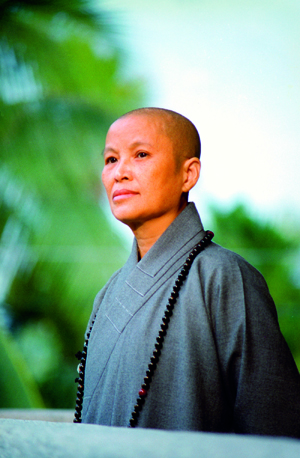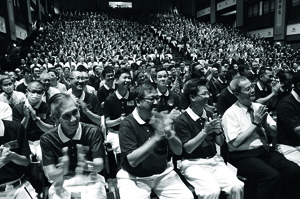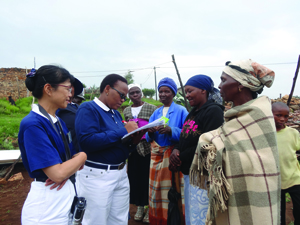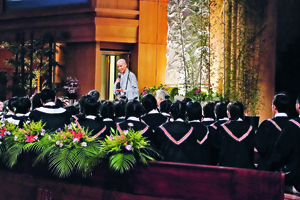

| A Way to Transform Our Minds | ||||||||
| By Dharma Master Cheng Yen Translated by Teresa Chang | ||||||||
Two training sessions were held in Taiwan in June 2014 for Tzu Chi volunteers from over 30 countries. The participants diligently learned and shared their personal growth stories and Tzu Chi experiences at the sessions. On the surface, they have different skin colors and speak different languages, but deep within they share the same Tzu Chi humanistic spirit. They all try to make the best of every moment by shouldering their responsibility to purify people’s minds; they all endeavor to live a life of value by being of benefit to others.
Many volunteers shared how they wake up early every morning to listen to my Dharma talks. Some talked about how doing so had changed their lives; others shared how those talks had taught them to work with others in harmony and unison. Their experiences demonstrate that when we take in the Dharma—the Buddha’s teachings—and thoroughly understand it, then we will naturally know the right direction to take in life. Without the help of the Dharma, it is difficult to transform people’s minds and relieve their suffering. After we have learned the Dharma, we must put it into practice in daily life. Let’s pave our paths with love, and transform our inner selves by being content, grateful, understanding and tolerant. Those who are content and grateful are the richest; those who are understanding and tolerant are the wisest. When we are content with what we have, we won’t be greedy. Insatiable greed gets us into trouble. When we are grateful at all times, we will love one another and get along in harmony, and our power will increase. When we are understanding, we will have the wisdom to discern right from wrong and will not suffer from delusions and mental afflictions. When we are tolerant, our mind will be broad enough to accommodate all there is in the world, our compassion for all living beings will be impartial, and we will be free from emotional entanglements such as selfish love, hatred and animosity. I often share my “Three No’s” with Tzu Chi volunteers: “In this world, there is no one I do not love, no one I do not trust, and no one I do not forgive.” Though I use the pronoun “I,” the same statement can be said by anyone. In this world, there is no one I do not love. Because I love everyone, I cannot bear to stand by when I learn that someone is suffering. I have to find out what I can do to lend a helping hand. In this world, there is no one I do not trust. “The mind, the Buddha, and living beings—there is no difference among these three.” Since all living beings have the buddha-nature, our love should not be limited to the human race. We should expand our love to all living creatures and treat them all with respect. In this world, there is no one I do not forgive. Life is full of suffering. If we understand life’s truths, we can help prevent regrettable things from happening. A change of mindset can eliminate hatred and enmity and lead to peace of mind. We learn the Dharma to help our wisdom grow and to bring blessings to the world. When we truly take the Buddha’s teachings to heart, we will remain untainted and maintain our pure innate nature through all sorts of problems, even in the face of numerous challenges presented by people suffering from all kinds of afflictions.
A will, a way Famine, drought, war… Faced with so much poverty and suffering in the world, what can we do? I believe the solution lies in giving. By “giving,” I mean the giving of not only money and food but also love. We need to give love to inspire the goodness in people’s hearts and bring peace to their minds. When peoples’ minds are balanced and at peace, they will not cause disasters. Our society will enjoy stability and harmony and love will be everywhere. Our Zulu volunteers from Durban, South Africa, visited Swaziland again in May and June to show new volunteers there how to take care of care recipients. Even though the Zulu volunteers were away from home, they watched recorded videos of my Dharma talks every day before setting out to visit the needy. Beatrice Sibisi, one of the volunteers from South Africa, is already 71 years old and has been in two car accidents. Even so, she plodded ahead undaunted on the undulating, uneven mountain roads. She never stopped to rest, but instead kept on going, gradually overtaking some younger volunteers. As they trod on, they sang a song composed by volunteers in Swaziland: “I’m going over the mountains and through dark forests. I’ll forever follow you, our beloved Master, on the Tzu Chi Path.” I truly admire their willpower and wisdom. Every time I speak of them, light seems to radiate from my heart. Physically they are very far away from Taiwan, and they live a life very different from ours, but the love in us is the same. Most of our volunteers in Africa are poor, yet by pooling their compassion they form a river of love and are able to nourish people in greater need than they are. They forge ahead on this path, never stopping or going back. Their contribution is no less than that of anyone else. This goes to show that a heart rich in love is like a field with abundant blessings. If you are rich in love, you will have unlimited strength to help others. As long as we have the will, no obstacles can stop us. As long we have love, no place is unreachable. The road may be rugged and bumpy, but with everyone walking hand in hand, it is not difficult to walk on. Our volunteers have also been promoting Tzu Chi missions in Lesotho. Some of the residents there have been inspired to join Tzu Chi. In May 2014, three gatherings were held on two days under the winter sun for aspiring volunteers. But Lesotho is spread out with a sparse population. How could the news of the gatherings be spread? By word of mouth. People in village after village learned about the events this way. They gathered in the open air and listened to volunteer Jennifer Chen (陳美娟) share about Tzu Chi. In order to spread Tzu Chi missions, Chen took local volunteers in her car and visited remote villages. Sometimes they had to travel across areas so bumpy and steep that Chen was quite scared. To cheer her on, volunteers in her car started chanting “Amitabha Buddha.” With that, she calmed down and found the courage to go on. It may not seem easy to sow seeds of love in this world, to bring the Dharma to people so that they can learn life’s truths and overcome their desires. But when Tzu Chi volunteers see more and more people following them on this path, when they see one community helping another community, one village helping another village, when they see love spreading everywhere, the joy they feel is so great that they keep pressing forward.
Our volunteers sincerely absorb the Dharma into their whole being—every cell in their body, heart, and brain. In this way they purify and transform themselves. Furthermore, they put the Buddha’s teachings into action and help relieve others from suffering. When they help themselves grow in wisdom and get rid of mental afflictions, they reveal an energy of love that can reach everywhere. It’s a blessing to serve others Every June, when I attend the commencement ceremonies at Tzu Chi schools, I always feel a lot of confidence in our graduates. In the ceremonies, I see them displaying good manners and showing respect to their teachers, and the teachers gently giving back to them their best wishes. Seeing this new blood joining the workforce, I feel a lot of hope for our society. Lin Sheng-han (林聖翰), the valedictorian this year at the Tzu Chi College of Technology, was a student in the Department of Nursing. He said that participating in the adaptation of the Compassionate Samadhi Water Repentance in 2012 inspired him to see nursing as his life calling. He is joining the emergency department at Hualien Tzu Chi Hospital to take care of acutely and severely ill patients. He said that he would serve patients with a smile on his face despite the high pressure of that work environment.
Wu Cheng-hao (吳承澔), who graduated from the Department of Social Work at Tzu Chi University this year, suffered from cerebral hypoxia at birth. He has a slight case of cerebral palsy and has undergone seven surgeries as a result. Every time he woke up from anesthesia after an operation, he always saw his mother at his bedside. He knew how hard his parents worked to take care of him. He told himself that no matter how painful the rehabilitation process might be, it could never compare with the hardships his parents had undergone for him. He was grateful that they had never given up on him, so he told himself he would never give up on himself either. He worked hard on his physical therapy, and he studied hard to make up for his physical deficiency. He said that he had received a lot of help from society; to pay back, he decided to stay in Hualien after graduation and devote himself to social work. “Master Cheng Yen says that the firmer your resolve, the greater your strength,” he said. “Even though I can’t move around as easily as others, I believe I’ll be able to overcome all difficulties as long as I have the will.” Xu Jin-yi (許晉譯), also a graduate of Tzu Chi University, said that when I hung a stethoscope on his neck [as I do for Tzu Chi medical students who are starting their internships, as a way to give them my blessings], he felt a sense of heavy responsibility, but a responsibility he willingly accepted. With that sense of mission, he was dedicating his expertise to Hualien Tzu Chi Hospital after he graduated. I was impressed by these young people who were determined to live a life of value by serving others and relieving suffering. In addition to treating illnesses, they hope to soothe patients’ anxiety with smiles on their faces. By working for the good of humanity, they will make the best use of the bodies their parents gave them. Despite advances in medical technology, the work of medical professionals has not become any easier. Instead, people’s misconceptions have made their work harder and added to their pressure. Under these circumstances, we need more people with a strong sense of commitment to join this field and work together for a better medical environment. Students who have been nurtured in our schools know that fame, status, and wealth don’t bring you real happiness—real happiness comes from being of service and benefit to others. I sincerely give my blessings to all these graduates. I hope that they will treat their workplace as a spiritual cultivation ground and happily give of themselves with the spirit of a bodhisattva.
Learn from Purna Purna Maitrayani Putra was one of the Buddha’s ten chief disciples and the foremost in expounding the Dharma. He once asked for the Buddha’s permission to go preach in Sudana. The Buddha told him that the place was undeveloped and people there were wild and aggressive, and that if he went there, he might encounter many difficulties and get into trouble. “They might shout angrily at you and insult you,” he warned. Purna replied that the uncivilized nature of the people there was even more of a reason to go share the Dharma with them and point out a good path for them to follow. Then he added, “If they yell at me, I’ll thank them for not beating me.” “What if they beat you with a stick?” the Buddha asked. “Then I’ll thank them for only hurting my body and not killing me with a knife,” answered Purna. “What if they kill you with a knife?” “I’ll still be grateful. If they take my life, it might be because I had hurt or killed them in a previous life. I was the one who induced this rancor from them, so I’d willingly repay my karmic debt with my life and thank them for letting me put an end to this negative affinity.” Despite the challenges that stood in his way to spread the Buddha’s teachings, Purna was undaunted. He believed that everyone possessed the buddha-nature and that with sincere piety and firm resolve, he would be able to change people and transform their minds. Seeing his confidence, resolve, and faith, the Buddha finally gave him his blessing. It is inevitable that we formed negative affinities with others in a previous life. As a result, no matter what we do, they just don’t like us; no matter how much we give to them, they are not happy. Even worse, they speak harshly to us and treat us badly. When that happens, we must keep in mind the karmic law of cause and effect—what happens to us is a result of what we did in a previous life. We must reflect on ourselves and not hold grudges. Furthermore, we should look upon this situation as an opportunity to cultivate ourselves. If we can willingly accept what comes our way, we will be able to mitigate the antagonism others feel toward us. In our life, we come into contact with all kinds of people with different temperaments. We should train ourselves to get along with them, to focus on their good points and accommodate their flaws. Then we will be able to turn bad into good and avoid forming negative affinities in this life. If we let go of our grudges, play our part the best we can, and harbor gratitude at all times, then we have truly taken the Dharma to heart and thoroughly understood the wholesome principles we should abide by in life. Let us all learn from Purna. He truly understood the Dharma, so he was able to do what he needed to do with unwavering faith and resolve. If we can learn from him, we’ll be able to dissolve all antagonism and shoulder all responsibilities, no matter how heavy they might be. No obstacles will stop us from striding forward on the Bodhi Path. Everyone goes through the cycle of birth, aging, illness and death. One day, we shall all return to dust, so there is really no need to quibble with others over any matter. Even our thoughts go through this cycle of arising, abiding, transforming, and disappearing. Facing this ever-changing world, we must seize every chance to do good. If we do that, we will be able to make the most of our transient life and sow blessings. On the other hand, if we let others’ opinions get to us, if we harbor bad thoughts and become attached to our ego, the chance to sow blessings will pass us by. We must often practice the Fourfold Mindfulness: Contemplate the body as impure, contemplate the senses as sources of suffering, contemplate the mind as impermanent and ever-changing, and contemplate all things as having no self. When we allow the Dharma to enter our hearts, we will be able to take good care of our minds and extinguish the fire of mental pollutants. Please be mindful at all times.
This article is excerpted from a series of speeches delivered by Master Cheng Yen from June 1 to 14, 2014. |















|




